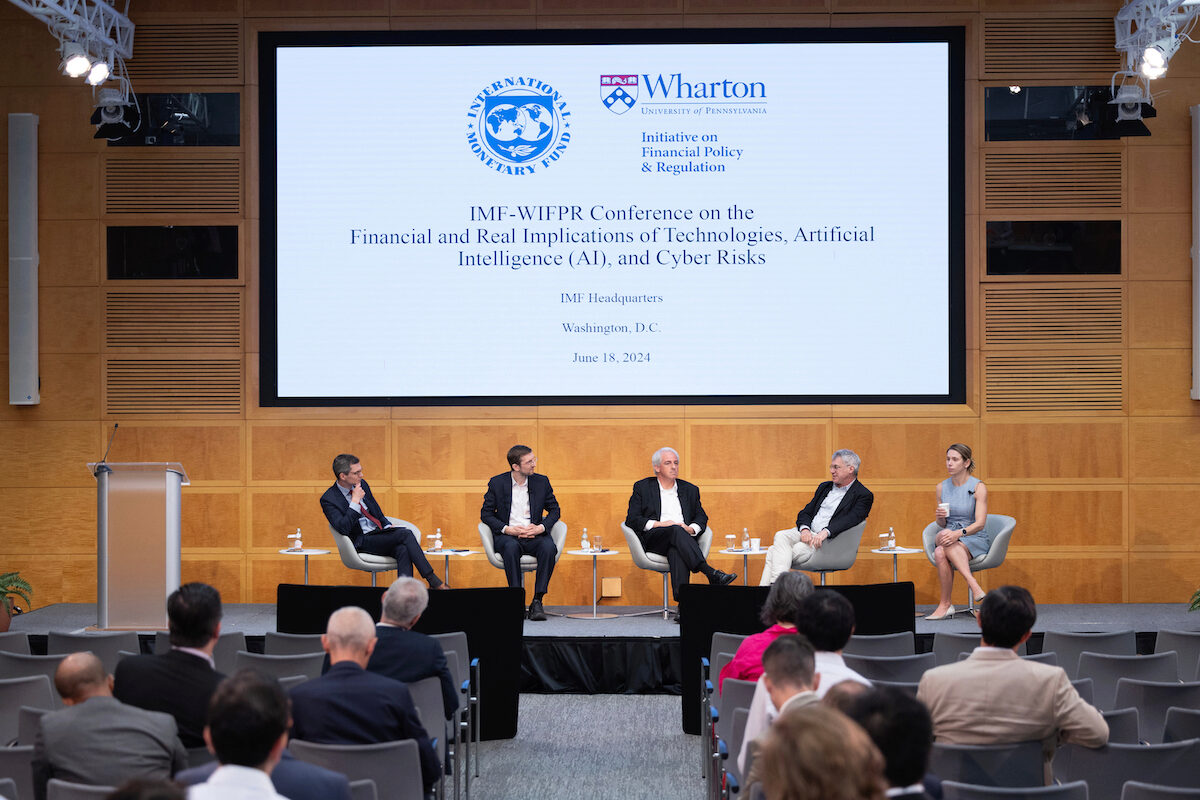
On June 18, 2024, the Wharton Initiative on Financial Policy and Regulation (WIFPR) co-hosted with the International Monetary Fund (IMF) the IMF-WIFPR Conference on Financial and Real Implications of Technologies, Artificial Intelligence (AI), and Cyber Risks. This is the second annual IMF-WIFPR conference, following up on last year’s Conference on Non-bank Financial Intermediation, Financial Stability, and Policy Responses. These conferences tackle critical topics at the forefront of financial stability, macroeconomic effects, and policy strategies.
WIFPR Director and Joel S. Ehrenkranz Family Professor Itay Goldstein and Wharton Assistant Professor of Finance Yao Zeng co-organized the conference with IMF colleagues Tobias Adrian (Financial Counsellor and Director of the Monetary and Capital Market Department), Fabio Natalucci (Deputy Director of the Monetary and Capital Markets Department), and Felix Suntheim (Deputy Division Chief in the Monetary and Capital Markets Department).
A headline panel on research, “New Technologies and Artificial Intelligence: Landscape, Challenges, and Outlook,” featured top academics discussing their work at the intersection of finance, technology, and AI. WIFPR director Itay Goldstein presented along with Anton Korinek (Professor of Economics, University of Virginia), Josh Lerner (Jacob H. Schiff Professor of Investment Banking, Harvard Business School), and Sabrina Howell (Professor of Finance, NYU Stern), in a conversation moderated by Felix Suntheim.
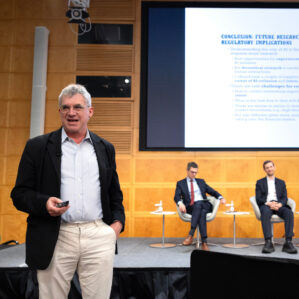
The panel began with a discussion of the risks and opportunities that AI poses to the economy with an emphasis on the financial sector. While panelists agreed that AI would bring about profound change, some focused more on the dangers while others were more hopeful about the vast opportunities at hand. The panel then discussed financial innovation generally and the use of technology in lending. As technology continues to change the financial system, researchers and policymakers need to work on how best to harness the benefits while responding to the risks.
Anton Korinek presented first on “Financial Markets in the Age of AI.” Korinek stressed that we are in a new paradigm for AI as we move from deep learning to foundation models. In the next decade, we’ll see the emergence of artificial general intelligence, which will be able to perform human cognitive tasks. This will have widespread ramifications, including the risk of losing jobs and exacerbating income inequality. For the effect on the financial sector, Korinek noted that throughout history, new technologies have brought forth new eras of finance and AI will be no exception. The AI era has many potential opportunities, including automating tasks, creating more efficient markets, and improving risk management. But it also poses challenges, such as the risk of dodging regulations and manipulating markets. Korinek argued that financial regulation needs to be updated for the age of AI.
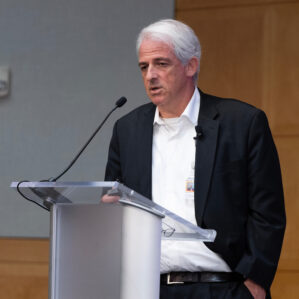
Itay Goldstein presented on “AI and Financial Markets.” Goldstein focused on three areas: the potential for AI collusion in financial markets, the question of whether AI will replace humans in finance, and the connection between AI and financial stability. Building on his research, Goldstein argued that AI systems could collude, which could harm competition, leading to lower liquidity, lower price informativeness, and higher mispricing. Goldstein also discussed work in progress with co-authors looking at whether AI will replace humans in the financial sector; preliminary results suggest that there are limits to AI dominance. Regarding financial stability, Goldstein highlighted that homogeneity of AI models can lead to synchronous action which could amplify responses to market shocks and that regulators will need to take this into account, potentially controlling the extent to which AIs can be similar to each other. Goldstein concluded by noting the need for much more research on the role of AI in financial markets and that AI will pose significant challenges for regulators.
The conversation then shifted to financial innovation. Josh Lerner presented on “The Changing Landscape of Financial Innovation.” Lerner discussed his research on patents in the financial sector, showing that financial patenting is substantial and that these patents are influential. He highlighted that finance firms constitute a shrinking share of financial patenting and that IT firms have become more important. Indeed, New York has become much less important for financial patenting while the Bay Area has become much more important. Lerner concluded noting that innovation shows no signs of subsiding and AI will likely accelerate shifts in the nature of financial patents and their location.
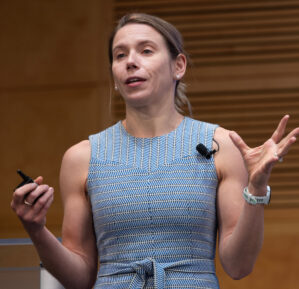
IMF Photo / Tom Brenner
The panel next turned to the application of technology. Sabrina Howell presented on “Automation and New Data in Small Business Lending.” Howell discussed her research into lending to small businesses and the effect of technology in reducing racial disparities in who gets access to loans. For example, Howell and co-authors found that more automation led to more lending to Black-owned firms in the Paycheck Protection Program. She argues that automation can mitigate disparities in lending by lowering fixed costs, being online, and removing human decision making.
The panel then opened up for discussion. There were a variety of views on the effects of AI on finance. Some participants worried whether the benefits would accrue to a small minority, whereas others argued that AI will help democratize finance (for instance, in providing custom advice on wealth management previously available to the wealthy only). Regarding the effect of AI on jobs, Goldstein stressed that some jobs are substitutes and some are complements with AI. As a result, AI will not wipe out every job or make everybody employee more productive; rather, some jobs will be displaced while some will be created. As far as the rents that AI companies earn from the new technology, panelists noted that it will be important to watch if AI continues to move away from its open-source origins, which will concentrate rents in the leading companies, as well as how antitrust enforcement develops.
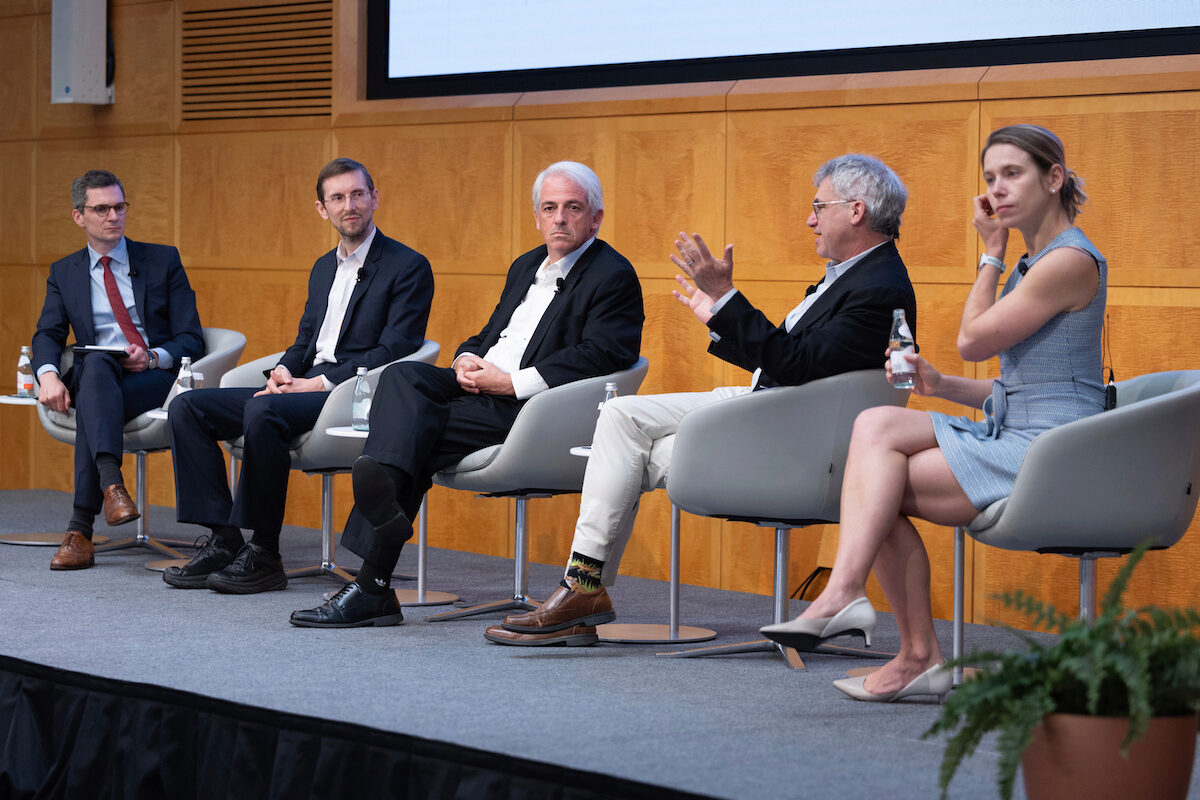
View the 2024 IMF-WIFPR Conference agenda
Learn more about the International Monetary Fund
View more posts on WIFPR’s Blog
All photos by IMF Photo / Tom Brenner


